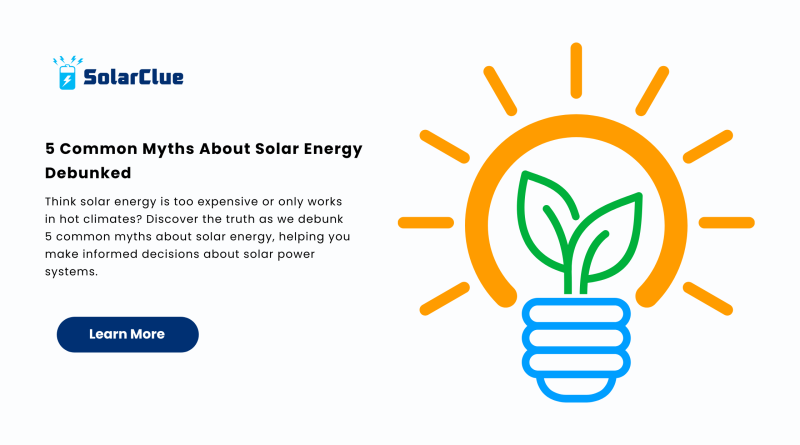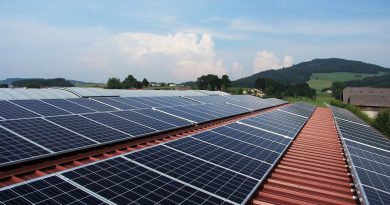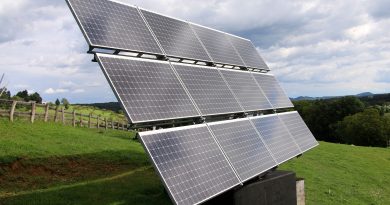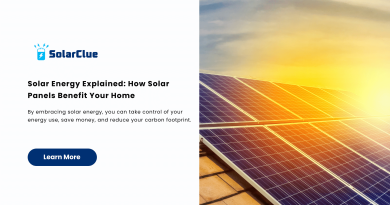5 Common Myths About Solar Energy Debunked
As the world shifts toward cleaner and more sustainable sources of power, solar energy has emerged as one of the most popular and promising alternatives. Yet, despite its growing adoption, there are still many lingering doubts and false beliefs surrounding it. These misconceptions often arise from outdated information, lack of awareness, or simply hearsay.
Some people believe solar panels only work in extreme sunlight, while others assume installing a solar power system is only for the wealthy. These misunderstandings can discourage individuals and businesses from exploring the incredible benefits that solar power can offer. That’s why it’s important to separate fact from fiction.
In this blog, we’ll break down the most common myths about solar energy and provide clear, evidence-based explanations to help you make an informed decision. Whether you’re considering solar for your home or business, this guide will give you the clarity you need.
Table of Contents
Solar Energy Misconceptions
Myth 1: Solar Panels Don’t Work on Cloudy or Rainy Days
One of the biggest misconceptions is that solar panels only generate electricity under bright, direct sunlight. While it’s true that solar panels are most efficient on sunny days, they still produce energy on cloudy and rainy days—just at a lower efficiency. Modern solar power systems are designed to absorb diffused sunlight, which means they can still function in low-light conditions.
In fact, countries like Germany—known for their cloudy weather—are leaders in solar energy adoption. This proves that you don’t need year-round sunshine to benefit from solar power.
Myth 2: Solar Power Is Too Expensive for Average Households
This might have been true a decade ago, but today, the cost of installing a solar panel system has dropped significantly. Government subsidies, tax incentives, and decreasing hardware prices have made solar energy more affordable than ever.
Additionally, financing options like solar loans and leasing models allow homeowners to install systems with little to no upfront costs. Over time, the savings on your electricity bills can outweigh the installation costs—making solar power a smart financial move.
Myth 3: Solar Panels Require Too Much Maintenance
Another common myth is that solar panels are high-maintenance. In reality, they require minimal maintenance. Most panels are designed to withstand harsh weather conditions and need only occasional cleaning to remove dust and debris.
With no moving parts, the chances of mechanical failure are low. Moreover, most solar panel manufacturers offer warranties of 20–25 years, ensuring long-term performance. Routine inspections once or twice a year are usually enough to keep your solar power system running efficiently.
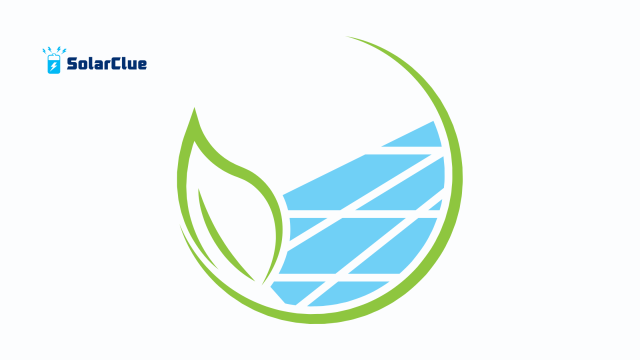
Myth 4: Solar Energy Can’t Power an Entire Home
Many believe that solar power systems can’t generate enough electricity to meet an entire household’s needs. This is simply not true. With proper system sizing based on your electricity consumption, solar panels can be configured to meet nearly 100% of your energy needs.
Even high-consumption devices like air conditioners and washing machines can be powered by solar energy, especially when paired with battery storage solutions. In case of excess generation, you can even feed energy back into the grid through net metering, further lowering your utility bills.
Myth 5: Solar Panels Will Damage My Roof
Some homeowners worry that installing solar panels might harm their roof structure. In fact, the opposite is often true. Professional installation ensures that panels are securely mounted and, in many cases, they actually protect the roof from harsh weather by acting as a shield.
Installers use proper mounting equipment and techniques to avoid leaks or structural damage. Additionally, if your roof does need repairs in the future, panels can be temporarily removed and reinstalled.
Why Understanding These Myths Matters
Understanding the truth about solar energy is crucial for making informed decisions. These myths often stem from outdated information or a lack of awareness about technological advancements. By debunking them, we hope to empower you to consider solar power as a reliable, cost-effective, and eco-friendly energy solution.
Benefits of Going Solar
-
Save on Electricity Bills: Drastically cut down on monthly utility costs.
-
Environmentally Friendly: Reduce your carbon footprint and contribute to a sustainable future.
-
Increased Property Value: Homes with solar panel systems often sell for more.
-
Energy Independence: Rely less on traditional power sources and fluctuating rates.
FAQs
Q1. Can I install solar panels if I live in an apartment?
Yes, with community solar programs or shared rooftop setups, even apartment dwellers can benefit from solar power systems.
Q2. How long do solar panels last?
Most solar panels have a lifespan of 25 to 30 years with minimal degradation in performance.
Q3. Do I need a battery with my solar system?
Not necessarily. While batteries help with energy storage, especially for off-grid setups, grid-tied systems can work efficiently without them.
Q4. Will I still get an electricity bill with solar?
If your solar power system doesn’t fully cover your usage, you may still receive a small bill. However, with net metering and proper sizing, you can greatly reduce or eliminate it.
Q5. Are there government incentives for installing solar panels?
Yes, many governments, including India, offer subsidies, tax benefits, and loans to promote solar energy adoption.
Solar power isn’t just the future—it’s the present. Don’t let outdated beliefs keep you from enjoying the benefits of clean, renewable solar energy. To explore trusted solutions, top solar panel brands, and personalized assistance, visit solarclue.com or explore informative articles at blog.solarclue.com—and take the first step toward a brighter, greener future.

